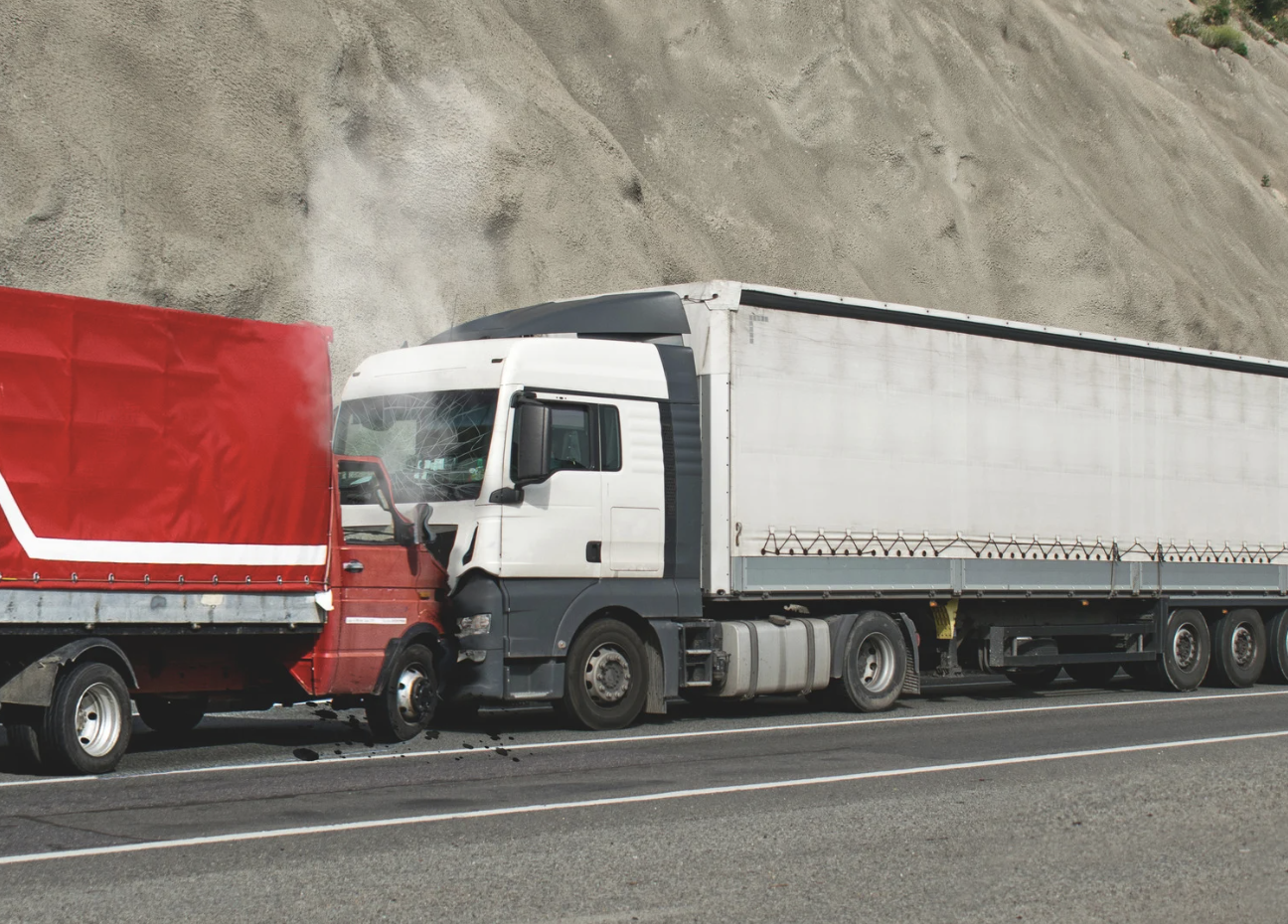Boston’s roads are busier than ever, with commercial trucks making thousands of deliveries daily through narrow streets, busy highways, and congested intersections. These large vehicles are essential to the economy, transporting goods across Massachusetts and beyond. That said, their size and weight make them especially dangerous in the event of an accident.
Understanding what causes trucking accidents helps drivers recognize risks and take steps to avoid them. Whether you’re behind the wheel of a passenger car or operating a commercial vehicle, knowing these common causes can keep you safer on Boston’s roads.
Common Causes of Trucking Accidents in Boston
Multiple factors contribute to trucking accidents, including human error and equipment failures. Here are the most common causes:
1) Driver fatigue
Truck drivers often work long hours under pressure to meet tight delivery deadlines. Federal regulations limit driving time to 11 hours per shift with mandatory rest breaks, but these rules aren’t always followed. Fatigue slows reaction times, impairs judgment, and increases the risk of falling asleep behind the wheel. A drowsy driver operating an 80,000-pound truck creates a deadly hazard for everyone nearby.
Trucking companies sometimes encourage drivers to push beyond safe limits to complete deliveries faster. This negligence puts profits ahead of safety, leading to devastating accidents.
2) Distracted driving
Like all drivers, truckers face temptations that pull their attention from the road. Cell phones, GPS devices, dispatch communications, eating, drinking, and adjusting controls all create distractions. A truck driver looking at a phone for just a few seconds can travel the length of a football field without watching the road.
Given the size and stopping distance of commercial trucks, even momentary inattention can result in catastrophic collisions. Boston’s dense traffic and complex roadways demand constant focus from truck drivers.
3) Improper loading
Cargo must be loaded and secured in accordance with strict weight distribution standards. Unbalanced loads can cause trucks to tip over during turns or lane changes. Overloaded trucks exceed weight limits, making them harder to control and increasing stopping distances. Improperly secured cargo can shift during transit, destabilizing the vehicle or falling onto the roadway.
Loading companies and trucking firms share responsibility for ensuring cargo is secured correctly. When they cut corners, innocent drivers pay the price.
4) Mechanical failures
Commercial trucks require regular maintenance to operate safely. Brake failures, tire blowouts, steering malfunctions, and lighting problems can all lead to serious accidents. Federal regulations mandate routine inspections, but some trucking companies neglect these requirements to save money or avoid taking vehicles out of service.
Worn brake pads, bald tires, and defective parts create preventable hazards. When mechanical failures cause accidents, trucking companies and maintenance providers may be held liable for resulting injuries.
5) Speeding and aggressive driving
Trucks traveling at excessive speeds need much longer stopping distances than passenger vehicles. At highway speeds, a fully loaded truck can require twice as much distance as a car to come to a complete stop. Speeding reduces the driver’s ability to react to sudden traffic changes, construction zones, or unexpected obstacles.
Aggressive driving behaviors, such as tailgating, unsafe lane changes, and failing to yield, create additional risks. Boston’s heavy traffic and frequent congestion make these behaviors especially dangerous.
6) Poor weather and road conditions
Massachusetts weather presents serious challenges for truck drivers. Snow, ice, rain, and fog reduce visibility and make roads slippery. Boston’s narrow streets, tight turns, and aging infrastructure add further complications. Trucks are particularly vulnerable to jackknifing on icy roads or losing control in high winds.
Drivers must adjust their speed and following distance for weather conditions. Trucking companies should never pressure drivers to maintain schedules when conditions make travel unsafe.
7) Substance use or impairment
Driving under the influence of alcohol, illegal drugs, or certain prescription medications is unlawful and extremely dangerous. Commercial drivers are held to stricter standards than passenger vehicle operators with lower legal blood alcohol limits. Some drivers use stimulants to stay awake during long hauls, creating additional impairment risks.
Drug and alcohol testing is required for commercial drivers, but not all trucking companies enforce these rules consistently. Impaired drivers pose an enormous threat to public safety.
How Trucking Companies Contribute to Risk
Many trucking accidents trace back to decisions made by trucking companies rather than individual drivers. These corporations often prioritize profits over safety in ways that increase accident risk:
- Negligent hiring or lack of driver training – Some companies fail to screen drivers or provide adequate training properly. Inexperienced or unqualified drivers operating commercial trucks create unnecessary dangers. Proper training should cover defensive driving techniques, load management, driving in adverse weather, and emergency procedures.
- Unrealistic delivery schedules leading to fatigue – Companies that impose impossible deadlines force drivers to skip rest breaks, exceed hour limits, and drive while exhausted. This pressure creates a culture where safety takes a backseat to speed.
- Failure to follow FMCSA safety regulations – The Federal Motor Carrier Safety Administration establishes rules governing driver qualifications, vehicle maintenance, cargo securements, and hours of service. Companies that ignore these regulations to cut costs put everyone at risk.
When trucking companies engage in these practices, they can be held liable for accidents caused by their negligence.
How to Avoid Trucking Accidents
Both passenger vehicle drivers and truck operators can take steps to prevent accidents and improve road safety.
Safe driving tips for car drivers sharing the road with trucks
- Stay out of blind spots. Trucks have large no-zones on all four sides where drivers cannot see other vehicles. If you can’t see the truck’s mirrors, the driver can’t see you.
- Give trucks plenty of space. Maintain extra following distance and never cut in front of a truck after passing. These vehicles need much more room to stop safely.
- Pass carefully and completely. When passing a truck, do so on the left side and make sure you can see the entire truck in your rearview mirror before moving back into the lane.
- Be patient. Trucks accelerate slowly, take wide turns, and may need extra time to navigate traffic. Avoid aggressive maneuvers around commercial vehicles.
Safety obligations for truck drivers and fleet managers:
- Truck drivers must follow hours-of-service regulations, take required rest breaks, and never drive while fatigued or impaired. They should conduct pre-trip inspections, report mechanical problems immediately, and adjust driving for weather and traffic conditions.
- Fleet managers must properly maintain vehicles, enforce safety regulations, provide thorough driver training, and create realistic schedules that don’t pressure drivers to cut corners.
Importance of routine vehicle inspections
Regular inspections catch mechanical problems before they cause accidents. Brakes, tires, lights, steering components, and cargo securement systems all require consistent attention. Both drivers and maintenance personnel play key roles in identifying and addressing safety issues.
What to Do If You’re Involved in a Trucking Accident
If you find yourself in a collision with a commercial truck, take these steps:
- Stay calm and call emergency services – Contact 911 immediately to report the accident and request medical assistance. Even if you feel uninjured, adrenaline can mask symptoms.
- Document the scene and exchange information – If safely possible, take photos of vehicle damage, road conditions, traffic signs, and visible injuries. Get the truck driver’s name, license number, insurance information, and employer details. Collect contact information from witnesses.
- Seek medical attention and legal guidance – See a doctor promptly, even for seemingly minor injuries. Some conditions, like whiplash or internal injuries, don’t show symptoms immediately. Contact an experienced trucking accident attorney who can protect your rights and investigate the crash while the evidence is still fresh.
How Boston Injury Law Group Can Help
Trucking accident cases are more complicated than typical car accidents. They often involve multiple parties, including trucking companies, drivers, cargo loaders, and maintenance providers. Federal and state regulations create additional legal considerations.
At Boston Injury Law Group, our attorneys have extensive experience handling trucking accident claims. We know how to investigate these cases thoroughly, uncovering the full scope of negligence that contributed to the crash.
We examine driver logs, maintenance records, black box data, and company policies. Our team collaborates with accident reconstruction experts who can determine precisely what happened and who bears responsibility.
We gather compelling evidence demonstrating how the truck driver, trucking company, or other parties failed in their duty of care. This includes violations of federal safety regulations, improper maintenance practices, or pressure to meet unrealistic schedules.
Trucking accidents often cause severe injuries with substantial medical expenses, lost income, and long-term care needs. Our contingency fee structure means you pay nothing unless we win your case.
Get Help After a Trucking Accident
Trucking accidents can happen in an instant, but you don’t have to handle the aftermath alone. If you or someone you love has been injured in a collision with a commercial truck, time is critical. Evidence disappears, memories fade, and legal deadlines rapidly approach.
Boston Injury Law Group is ready to fight for your rights and help you secure the compensation you deserve. Our experienced attorneys will guide you through the legal process while you focus on recovery.
Contact Boston Injury Law Group today to discuss your case in a free consultation. Let us help you move forward with confidence and justice.



